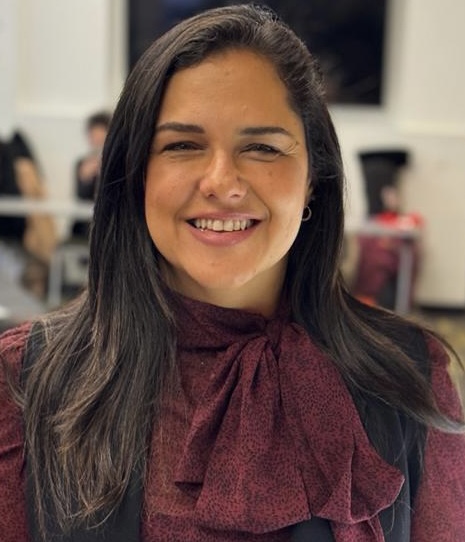By Ángela Colón
Ángela Colón shares how the SCMP certification has professionally contributed to the VP of volunteers and mentorship from IABC/Toronto, Yasmine El Shafei.

Yasmine El Shafei arrived in Canada 4 years ago, she was living in Egypt, supported UNDP projects as a researcher, launched the digital magazine 925, and worked for companies like Influence Communications and Egyptian Banking Institute. She came to Ontario for professional development opportunities and, nowadays, she is the Co-Managing Partner of Multiplier Consultancy and vice president of volunteers and mentorship from IABC/Toronto.
This year, she took the Strategic Communication Management Professional Certification Program (SCMP) from IABC and would like to share how it has contributed to her career path in Canada.
Q: Why did you decide to get certified?
A: All my knowledge in corporate communication was developed through work experiences. I always wanted to validate what I have done throughout all these years, and I knew that getting certified was the path. Also, I wanted to open the doors to other coming opportunities that implied working in an international setting.
Q: Why did you choose the SCMP Certification program specifically?
A: After the pandemic started to alleviate, I met a distinguished expert from the communications field. He suggested I join IABC/Toronto as a member and volunteer since I was interested in learning more about the communications industry and wanted to grow my career here. In my journey with IABC/Toronto, I was honoured to work with experts like Chantelle Cabral, President of this association. She told me about her great experience with the SCMP program, which became another motivational factor to take the certification.
Q: How has the SCMP certification contributed to your skill upgrading?
A: Firstly, it opened horizons to different spectrums and knowledge whether in management and leadership, internal communications, communications ethics and new trends, reputation, and risk management.
Secondly, the SCMP program gave me a new perspective on how to manage communication crises. Before I took the certification while working at Multiplier Consultancy, I had a narrow approach to communications crises: they should only be tackled from the communications side. This view of crises management changed when I joined the SCMP program as I learned that you need to determine which bugs in every business unit are creating the crises. A communications crisis doesn’t necessarily start from an error in the communications department, it can come from other areas and, as a communications manager or practitioner, you need to understand that you have to take a holistic approach to solve issues. For example, when providing recommendations for crisis management you shouldn’t only make suggestions related to the communications department but also suggestions on human resources, operations, sales, and business practices. This is one of the reasons I recommend taking the SCMP certification, because it broadens your mind.
Thirdly, one of the main contributions of SCMP to my professional development has been the fact that I think more strategically and proactively.
Q: How has the SCMP certification impacted your career development?
A: It has allowed me to dream about my future communications consultancy company and given me the opportunity to use the new knowledge in my current job and the teams I work with. This is great because I feel that I can add valuable solutions to other companies.
I would like to add that I don’t take this certification for a short-term purpose, say, to find the next job. This is what happens to some communicators, and it is valid. However, the motivation may go further – you can take all of what you gain to the maximum level and use it for the journey. What you learn in SCMP lasts for the long run and you can use your new skills in further case studies that come up. I simply recommend communicators see this program as a long-lasting benefit.
Q: What would you say to communicators who want to take the SCMP certification program?
A: That the real value comes when you apply this knowledge in your career. Each journey is different and the best you can do is to reflect your SCMP knowledge at work.
Q: What tips would you provide to those who are already enrolled in the program?
A: 1) Join study groups: they help you prepare for your final exam
2) Having a study plan: it helps to balance your time and develop the program easily
3) Invest more time in the categories where you have lesser experience (e.g. ethics, crisis pillars…)
Q: How did you personally organize your time to get certified?
A: I took one month to complete the program. In the beginning, I made study a plan which included a deadline for the final exam. So basically, I went through the study material for three weeks and made a recap on the last week. After that, I did the test.
Q: Any final thoughts on SCMP?
A: It is a great program, I just highly recommend it as it widens your vision as a communicator.

About the Author
Ángela Colón is a bilingual corporate communications and journalism professional with over 3 years of experience in developing effective communication strategies for North American and Latin American organizations. She has worked for Finalsite, Dialogue Marketing Communications, Neora, and the Embassy of Colombia in the Republic of South Korea. She currently performs the role of writer for the Communicator Magazine at IABC/Toronto
Return to the Winter 2024 Issue of Communicator
READ MORE

Communicator January 2025: Accessibility and Artificial Intelligence (AI)
In our January edition, we explore how Accessibility and Artificial Intelligence (AI) are reshaping the communications landscape, balancing cutting-edge innovation with empathy and inclusion for a rapidly evolving future. Read […]
10 Goals for Growth for 2025
By Mandy Silverberg Mandy Silverberg offers goal setting tips for communicators to grow personally and professional in 2025. Looking to grow professionally and personally in 2025? Start […]
How AI Can Make us Better Professionals
By Bryan G. Jones, Founder and CEO BGJ Global Business owner Bryan G. Jones discusses the impact of artificial intelligence on the role of communicators and offers tips on […]
Communicating your message in multiple languages
By Linda Bicho-Vachon Linda Bicho-Vachon looks at AI translation tools and whether they can reduce our reliance on human translators. If you’re a multi-national company, communicating a […]
Communicating across cultures
Making messages meaningful in a multicultural world By Roopal Chaturvedi “As communicators, our task is clear: make messages land, not bounce.” Roopal Chaturvedi describes the challenges of communicating across cultures […]